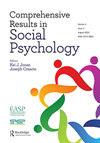电车问题中的利他自杀
引用次数: 1
摘要
64名参加心理学课程的学生面临“电车困境”:要么是桥上的人把一个陌生人(被撞死)推到火车的轨道上,使火车改道,从而挽救了火车轨道上5名工人的生命,要么是这个人自己跳桥(被撞死),以使火车改道。自杀者的英雄主义得分明显高于谋杀者,自杀行为的“正确行为”得分也高于谋杀者。本文章由计算机程序翻译,如有差异,请以英文原文为准。
Altruistic suicide in the trolley problem1
Abstract Sixty-four students enrolled in psychology courses were given the “trolley dilemma” in which either the person on the bridge pushed a stranger (who was killed) into the path of a train, diverting it and thereby saving the lives of five workmen on the train tracks, or the person himself or herself jumped off the bridge (and was killed) in order to divert the train. The suicide received significantly higher scores for heroism than the murderer, and the act of suicide was given higher scores for being “the right thing to do.”
求助全文
通过发布文献求助,成功后即可免费获取论文全文。
去求助
来源期刊

Comprehensive Results in Social Psychology
Psychology-Social Psychology
CiteScore
3.40
自引率
0.00%
发文量
7
 求助内容:
求助内容: 应助结果提醒方式:
应助结果提醒方式:


